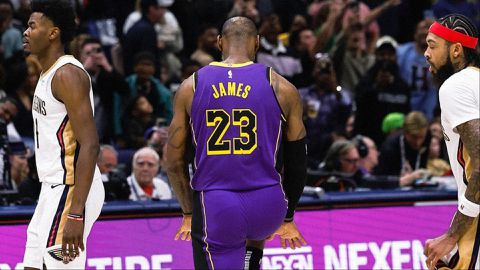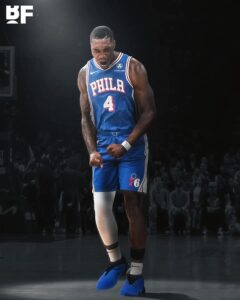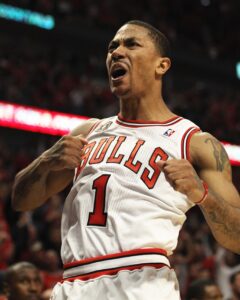
LeBron James has once again been the center of attention in the NBA after the Los Angeles Lakers secured a crucial victory over the New Orleans Pelicans. The 39-year-old superstar continues to defy age, showcasing an elite level of performance that many thought would decline years ago. However, while LeBron’s scorching-hot streak is impressive, it’s time to ask the uncomfortable question: Are the Lakers really winning because of LeBron, or are they simply riding his individual brilliance to success?
LeBron’s Continued Dominance
The Lakers’ recent 121-116 victory over the Pelicans added another chapter to LeBron James’ storied career. The King finished the game with 30 points, 10 rebounds, and 7 assists, further solidifying his case as one of the best players of all time. His impact was felt on both ends of the floor, especially when the game was on the line in the final minutes, where his leadership and ability to perform in clutch moments proved pivotal.
Despite being in his 21st season, LeBron shows no signs of slowing down. His scoring ability remains elite, and his basketball IQ is unmatched. But while his individual performance is awe-inspiring, it also raises a critical question: Are the Lakers truly a championship-caliber team, or are they simply living off LeBron’s incredible consistency and ability to carry the team?
The LeBron Dependence
It’s impossible to ignore the fact that the Lakers’ success in recent seasons is heavily reliant on LeBron James. Since his arrival in Los Angeles in 2018, the Lakers have made the playoffs in multiple seasons, including a championship run in 2020, largely due to his presence. However, the team’s performance without him on the floor often leaves much to be desired. In fact, when LeBron is off the court, the Lakers frequently struggle, which raises questions about the team’s overall depth and cohesion.
Take the recent victory over the Pelicans, for example. LeBron’s dominant performance was undeniably the main reason the Lakers secured the win, but what happens when LeBron has an off night or is unavailable due to injury? The Lakers’ struggles without him on the floor speak volumes about their reliance on one player. While Anthony Davis has the potential to be an elite player, his performance is often inconsistent, and the supporting cast—players like D’Angelo Russell, Austin Reaves, and Rui Hachimura—has yet to demonstrate the ability to step up in a way that can replace LeBron’s production.
This isn’t to say that LeBron isn’t still one of the best players in the league—he is. However, it’s becoming increasingly evident that the Lakers’ title hopes are heavily dependent on his health and sustained excellence. If he goes down with a significant injury or if his performance declines, the Lakers could be left in a precarious position.
Is LeBron’s Streak Hiding Deeper Issues?
Another angle to consider is whether the Lakers’ reliance on LeBron’s hot streak is masking deeper issues within the team. While LeBron continues to perform at an elite level, it’s worth asking whether the Lakers are truly building a sustainable and balanced roster, or if they are relying too heavily on one player to carry the load.
For instance, the Lakers have struggled to develop a consistent bench unit. While players like Malik Beasley and Jaxson Hayes have shown flashes of potential, their inconsistency has been a major concern. The team’s offense often stalls when LeBron isn’t on the floor, and their defense, though solid at times, lacks the same intensity when he’s not around to provide leadership. In many ways, the Lakers’ success appears to be a reflection of LeBron’s greatness rather than the team’s collective effort.
Moreover, the lack of a true second superstar has been a longstanding issue. Anthony Davis has the potential to be that player, but injuries and inconsistent performances have kept him from being a reliable co-pilot for LeBron. The Lakers’ front office has tried to build around LeBron with a mix of veterans and role players, but the results have been uneven. The team’s reliance on LeBron to perform at an MVP level every night may ultimately prove to be unsustainable in the long term, especially as he continues to age.
The Lakers’ Future: Are They Built for the Long Haul?
The big question moving forward is whether the Lakers can build a team capable of contending for championships without needing LeBron to carry them on his back. While LeBron’s incredible streak has allowed the Lakers to remain relevant in the playoff race, it’s unclear how long his dominance can last. At some point, Father Time will catch up, and the Lakers will need to find a way to win without relying on LeBron to be the centerpiece of their offense.
The answer to this question may lie in Anthony Davis. When he’s healthy and engaged, Davis is one of the best players in the league. But can he stay healthy? Can he become the consistent superstar the Lakers need him to be? That remains to be seen. Until then, the Lakers will continue to live and die by LeBron’s greatness, which may ultimately limit their potential for long-term success.
Conclusion: LeBron’s Unstoppable Streak or the Lakers’ Weakness?
As the Lakers continue their season, one thing is clear: LeBron James is playing at an elite level, and his performance is a key reason for the team’s success. However, it’s equally clear that the Lakers’ championship aspirations hinge on his continued excellence, and their reliance on him may ultimately prove to be their greatest weakness. While LeBron’s individual brilliance is undeniable, the Lakers’ long-term success depends on building a more balanced, sustainable team that doesn’t rely so heavily on one player’s scorching-hot streak. Until then, the question remains: Are the Lakers winning because of LeBron, or are they simply surviving until the inevitable day his streak finally ends?






